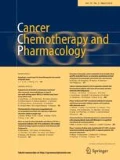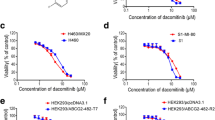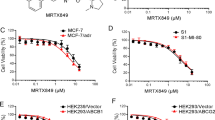Abstract
Purpose
Cediranib (recentin, AZD2171) is an oral small-molecule multiple receptor tyrosine kinases inhibitor. Here we investigate the ability of cediranib to reverse tumor multidrug resistance (MDR) due to overexpression of ABCB1 (P-glycoprotein) and ABCC1 (MRP1) transporters.
Methods
KBv200,MCF-7/adr, C-A120 and their parental sensitive cell lines KB, MCF-7 and KB-3-1 were used for reversal study. The intracellular accumulations of doxorubicin and rhodamine 123 were determined by flow cytometry. The expressions levels of ABCB1 and ABCC1 were investigated by Western blot and RT-PCR analyses. ATPase activity assay were performed by Luminescence. The functions of ERK in MCF-7/adr were investigated by RNA interference.
Results
Cediranib significantly enhanced the sensitivity of ABCB1 or ABCC1 substrates in MDR cells, with no effect found on sensitive cells. However, the expressions of these transporters were not affected and the reversal activity of cediranib was not related to the phosphorylation of AKT or ERK1/2. Further studies showed that cediranib inhibited ATPase activity of ABCB1 (P-glycoprotein) in a dose-dependent manner.
Conclusions
Cediranib reverses ABCB1- and ABCC1-mediated MDR by directly inhibiting their drug efflux function. These findings may be useful for cancer combinational therapy with cediranib in the clinic.





Similar content being viewed by others
References
Dean M, Rzhetsky A, Allikmets R (2001) The human ATP-binding cassette (ABC) transporter superfamily. Genome Res 11:1156–1166
Gillet JP, Efferth T, Remacle J (2007) Chemotherapy-induced resistance by ATP-binding cassette transporter genes. Biochim Biophys Acta 1775:237–262
Juliano RL, Ling V (1976) A surface glycoprotein modulating drug permeability in Chinese hamster ovary cell mutants. Biochim Biophys Acta 455:152–162
Ambudkar SV, Kimchi-Sarfaty C, Sauna ZE et al (2003) P-glycoprotein: from genomics to mechanism. Oncogene 22:7468–7485
Cole SP, Bhardwaj G, Gerlach JH et al (1992) Overexpression of a transporter gene in a multidrug-resistant human lung cancer cell line. Science 258:1650–1654
Loe DW, Deeley RG, Cole SP (1998) Characterization of vincristine transport by the M(r) 190,000 multidrug resistance protein (MRP): evidence for cotransport with reduced glutathione. Cancer Res 58:5130–5136
Hegedus T, Orfi L, Seprodi A et al (2002) Interaction of tyrosine kinase inhibitors with the human multidrug transporter proteins, MDR1 and MRP1. Biochim Biophys Acta 1587:318–325
Kitazaki T, Oka M, Nakamura Y et al (2005) Gefitinib, an EGFR tyrosine kinase inhibitor, directly inhibits the function of P-glycoprotein in multidrug resistant cancer cells. Lung Cancer 49:337–343
Houghton PJ, Germain GS, Harwood FC et al (2004) Imatinib mesylate is a potent inhibitor of the ABCG2 (BCRP) transporter and reverses resistance to topotecan and SN-38 in vitro. Cancer Res 64:2333–2337
Shi Z, Peng XX, Kim IW et al (2007) Erlotinib (Tarceva, OSI-774) antagonizes ATP-binding cassette subfamily B member 1 and ATP-binding cassette subfamily G member 2-mediated drug resistance. Cancer Res 67:11012–11020
Dai CL, Tiwari AK, Wu CP et al (2008) Lapatinib (Tykerb, GW572016) reverses multidrug resistance in cancer cells by inhibiting the activity of ATP-binding cassette subfamily B member 1 and G member 2. Cancer Res 68:7905–7914
Mi Y, Lou L (2007) ZD6474 reverses multidrug resistance by directly inhibiting the function of P-glycoprotein. Br J Cancer 97:934–940
Wedge SR, Kendrew J, Hennequin LF et al (2005) AZD2171: a highly potent, orally bioavailable, vascular endothelial growth factor receptor-2 tyrosine kinase inhibitor for the treatment of cancer. Cancer Res 65:4389–4400
Zhang JY, Wu HY, Xia XK et al (2007) Anthracenedione derivative 1403P-3 induces apoptosis in KB and KBv200 cells via reactive oxygen species-independent mitochondrial pathway and death receptor pathway. Cancer Biol Ther 6:1413–1421
Fu L, Liang Y, Deng L et al (2004) Characterization of tetrandrine, a potent inhibitor of P-glycoprotein-mediated multidrug resistance. Cancer Chemother Pharmacol 53:349–356
Sumizawa T, Chuman Y, Sakamoto H et al (1994) Non-P-glycoprotein-mediated multidrug-resistant human KB cells selected in medium containing adriamycin, cepharanthine, and mezerein. Somat Cell Mol Genet 20:423–435
Chen LM, Wu XP, Ruan JW et al (2004) Screening novel, potent multidrug-resistant modulators from imidazole derivatives. Oncol Res 14:355–362
Sumizawa T, Chen ZS, Chuman Y et al (1997) Reversal of multidrug resistance-associated protein-mediated drug resistance by the pyridine analog PAK-104P. Mol Pharmacol 51:399–405
West KA, Castillo SS, Dennis PA (2002) Activation of the PI3K/Akt pathway and chemotherapeutic resistance. Drug Resist Updat 5:234–248
McCubrey JA, Steelman LS, Chappell WH et al (2007) Roles of the Raf/MEK/ERK pathway in cell growth, malignant transformation and drug resistance. Biochim Biophys Acta 1773:1263–1284
Nikolinakos P, Heymach JV (2008) The tyrosine kinase inhibitor cediranib for non-small cell lung cancer and other thoracic malignancies. J Thorac Oncol 3:S131–S134
Laurie SA, Gauthier I, Arnold A et al (2008) Phase I and pharmacokinetic study of daily oral AZD2171, an inhibitor of vascular endothelial growth factor tyrosine kinases, in combination with carboplatin and paclitaxel in patients with advanced non-small-cell lung cancer: the National Cancer Institute of Canada clinical trials group. J Clin Oncol 26:1871–1878
Gomez-Rivera F, Santillan-Gomez AA, Younes MN et al (2007) The tyrosine kinase inhibitor, AZD2171, inhibits vascular endothelial growth factor receptor signaling and growth of anaplastic thyroid cancer in an orthotopic nude mouse model. Clin Cancer Res 13:4519–4527
Drevs J, Siegert P, Medinger M et al (2007) Phase I clinical study of AZD2171, an oral vascular endothelial growth factor signaling inhibitor, in patients with advanced solid tumors. J Clin Oncol 25:3045–3054
Takeda M, Arao T, Yokote H et al (2007) AZD2171 shows potent antitumor activity against gastric cancer over-expressing fibroblast growth factor receptor 2/keratinocyte growth factor receptor. Clin Cancer Res 13:3051–3057
Shukla S, Sauna ZE, Ambudkar SV (2008) Evidence for the interaction of imatinib at the transport-substrate site(s) of the multidrug-resistance-linked ABC drug transporters ABCB1 (P-glycoprotein) and ABCG2. Leukemia 22:445–447
Brendel C, Scharenberg C, Dohse M et al (2007) Imatinib mesylate and nilotinib (AMN107) exhibit high-affinity interaction with ABCG2 on primitive hematopoietic stem cells. Leukemia 21:1267–1275
Coley HM, Shotton CF, Ajose-Adeogun A et al (2006) Receptor tyrosine kinase (RTK) inhibition is effective in chemosensitising EGFR-expressing drug resistant human ovarian cancer cell lines when used in combination with cytotoxic agents. Biochem Pharmacol 72:941–948
Normanno N, De Luca A, Bianco C et al (2006) Epidermal growth factor receptor (EGFR) signaling in cancer. Gene 366:2–16
Grant S, Qiao L, Dent P (2002) Roles of ERBB family receptor tyrosine kinases, and downstream signaling pathways, in the control of cell growth and survival. Front Biosci 7:d376–d389
Knuefermann C, Lu Y, Liu B et al (2003) HER2/PI-3K/Akt activation leads to a multidrug resistance in human breast adenocarcinoma cells. Oncogene 22:3205–3212
Li QQ, Wang WJ, Xu JD et al (2007) Involvement of CD147 in regulation of multidrug resistance to P-gp substrate drugs and in vitro invasion in breast cancer cells. Cancer Sci 98:1064–1069
Colone M, Calcabrini A, Toccacieli L et al (2008) The multidrug transporter P-glycoprotein: a mediator of melanoma invasion? J Invest Dermatol 128:957–971
Osborn MT, Berry A, Ruberu MS et al (1999) Phorbol ester induced MDR1 expression in K562 cells occurs independently of mitogen-activated protein kinase signaling pathways. Oncogene 18:5756–5764
Ambudkar SV, Dey S, Hrycyna CA et al (1999) Biochemical, cellular, and pharmacological aspects of the multidrug transporter. Annu Rev Pharmacol Toxicol 39:361–398
Acknowledgments
We thank professor Xu-yi Liu (Cancer Hospital of Beijing, China) for ABCB1 overexpressing KBv200 cells and parental sensitive KB cells. The work was supported by grants from China National Natural Sciences Foundation No. 30672407,No. 30600769, Medical Science and Technology Research Foundation of Guang Dong Province No. A2006224 and 863 Project Foundation No. 2006AA09Z419.
Author information
Authors and Affiliations
Corresponding author
Rights and permissions
About this article
Cite this article
Tao, Ly., Liang, Yj., Wang, F. et al. Cediranib (recentin, AZD2171) reverses ABCB1- and ABCC1-mediated multidrug resistance by inhibition of their transport function. Cancer Chemother Pharmacol 64, 961–969 (2009). https://doi.org/10.1007/s00280-009-0949-1
Received:
Accepted:
Published:
Issue Date:
DOI: https://doi.org/10.1007/s00280-009-0949-1




